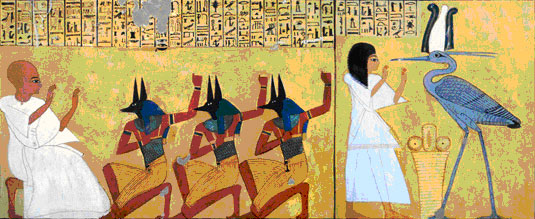EGYPTIAN civilization goes back more than 6,000 years to the beginning of settled life along the banks of the Nile River. Within the long sweep of Egyptian history, certain events or epochs have been crucial to the development of Egyptian society and culture. One of these was the unification of Upper Egypt and Lower Egypt sometime in the third millennium B.C. The ancient Egyptians regarded this event as the most important in their history, comparable to the "First Time," or the creation of the universe. With the unification of the "Two Lands" by the legendary, if not mythical, King Menes, the glorious Pharaonic Age began. Power was centralized in the hands of a god-king, and, thus, Egypt became the first organized society.
The ancient Egyptians were the first people of antiquity to believe in life after death. They were the first to build in stone and to fashion the arch in stone and brick. Even before the unification of the Two Lands, the Egyptians had developed a plow and a system of writing. They were accomplished sailors and shipbuilders. They learned to chart the heavens in order to predict the Nile flood. Their physicians prescribed healing remedies and performed surgical operations. They sculpted in stone and decorated the walls of their tombs with naturalistic murals in vibrant colors. The legacy of ancient Egypt is written in stone across the face of the country from the pyramids of Upper Egypt to the rock tombs in the Valley of the Kings to the Old Kingdom temples of Luxor and Karnak to the Ptolemaic temples of Edfu and Dendera and to the Roman temple to Isis on Philae Island.


